Key takeaways:
- Audio news aggregators offer a personalized and efficient way to consume news, enhancing emotional resonance and fostering community engagement.
- Effective aggregators curate diverse content, providing multiple perspectives that encourage informed dialogue and critical thinking.
- Reality TV can reveal genuine human emotions and complexities, prompting viewers to reflect on their own lives and societal pressures.
- Analyzing reality TV involves understanding character dynamics, editing techniques, and participant motivations to grasp deeper narratives and media influence.

Understanding audio news aggregator
An audio news aggregator is like the personal curator of your auditory news experience. Imagine waking up in the morning, brewing your coffee, and having tailored news updates delivered directly to your ears. I often find myself wondering how many hours I’ve saved by consuming news in this manner, instead of sifting through endless articles online.
What’s intriguing is the way these platforms can connect us to voices and stories we might otherwise overlook. For instance, I remember discovering a passionate podcast about local community initiatives that I never would have known existed if I were just reading text-based news. It’s a reminder that sometimes, the way we consume content can profoundly shape what we learn and feel connected to.
Moreover, the convenience is unparalleled. Picture multitasking: I can listen to the latest headlines while driving or exercising. It raises an interesting question—are we becoming more informed in this auditory age? From my experience, there’s something about listening to news that not only informs but also evokes a deeper emotional resonance, enhancing our understanding and empathy towards different perspectives.
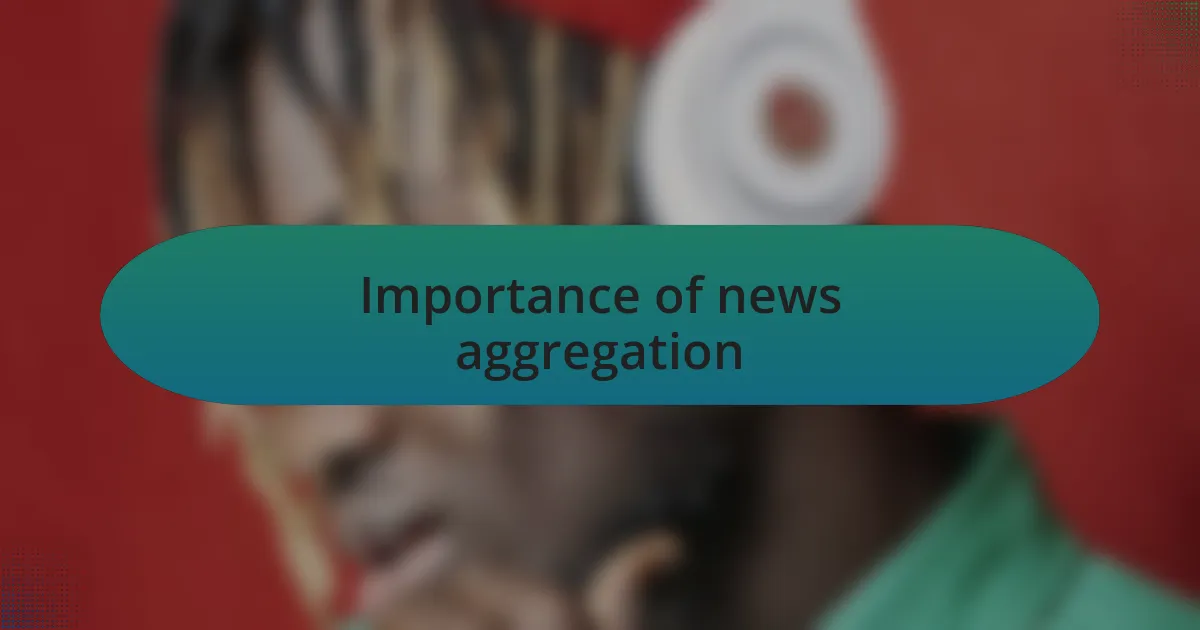
Importance of news aggregation
News aggregation plays a crucial role in today’s information landscape. With the sheer volume of news produced daily, finding reliable and relevant content can feel overwhelming. I often find myself in situations where I’m pressed for time, and having an aggregator means I can quickly access the most pertinent stories without diving into the chaos of multiple websites. It’s like having a personal assistant sorting through a massive library of narratives, helping me focus on what truly matters.
What’s fascinating is how aggregators can highlight a range of viewpoints and sources. One afternoon, while I was listening to an audio summary, I encountered a story that presented a perspective I hadn’t considered before. It made me reflect on my biases and understand the importance of a well-rounded view. The ability to juxtapose different opinions and facts allows me to engage more thoughtfully in discussions and enhances my understanding of complex issues.
The efficiency of news aggregation also means I can stay updated on various topics that resonate with me on a personal level. I remember a time when an aggregated update about an environmental initiative sparked my interest and motivated me to get involved in local conservation efforts. It’s moments like these that truly illustrate how news aggregation doesn’t just inform but inspires action, fostering a sense of community and engagement.
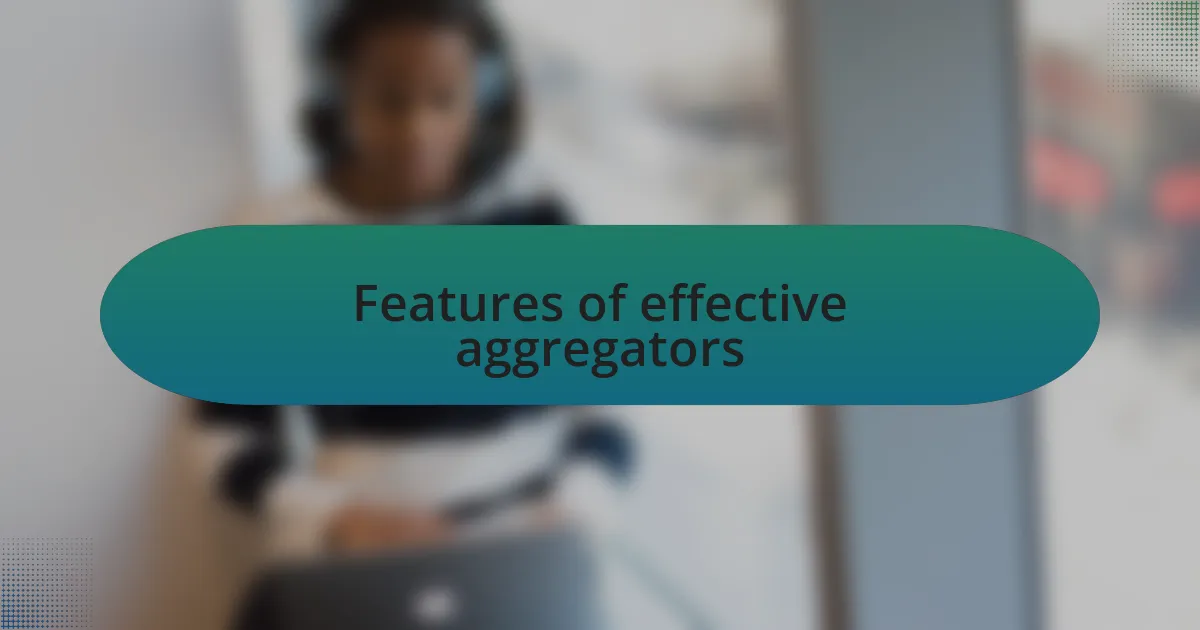
Features of effective aggregators
Effective news aggregators share the ability to curate content from diverse sources, ensuring a well-rounded perspective. I remember a time when I stumbled upon contrasting views on a controversial issue through my aggregator—each article enriched my understanding and prompted me to question my initial stance. How often do we take a moment to consider the multitude of angles on a topic? It’s this depth of coverage that elevates the aggregator beyond mere collection; it’s about fostering informed dialogue.
User-friendly design is another crucial feature that I appreciate in high-quality aggregators. When I find myself in a rush, a clean layout with easily navigable sections makes a world of difference. I once experienced frustration with a cluttered interface that hindered my quick access to relevant updates. It made me realize that the best tools are those that respect my time, making it effortless to engage with the content I care about.
Moreover, timely updates are essential for any effective aggregator. There was a day when a late-breaking financial story reached me through my preferred aggregator before traditional news outlets even caught wind of it. This real-time delivery is what makes these platforms invaluable; it’s as if they’re ahead of the curve, delivering insights that can influence decisions right when they matter most. Who wouldn’t want to stay a step ahead in today’s fast-paced world?
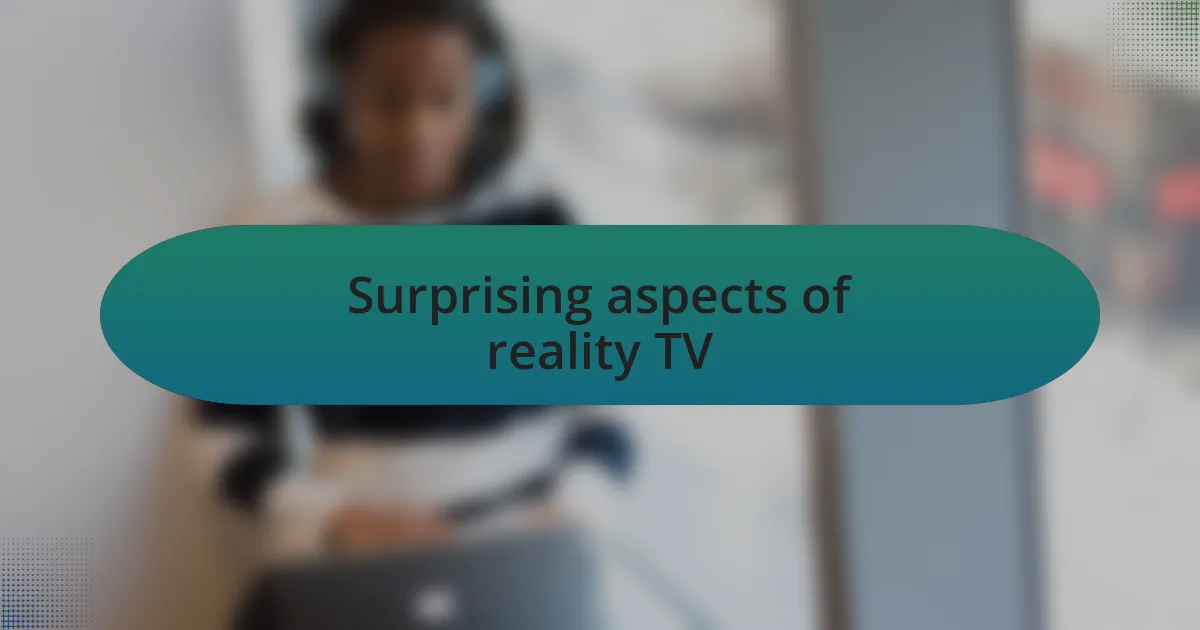
Surprising aspects of reality TV
One aspect of reality TV that truly fascinates me is the way it reflects genuine human emotions in extreme situations. While we often think that the drama is highly scripted, I’ve realized through personal viewing experiences that some reactions are surprisingly authentic. Remember the time I watched a reality show where contestants faced their deepest fears? I felt this mix of admiration and discomfort; witnessing their vulnerability made me reconsider the boundaries we often impose on ourselves.
Another surprising element lies in the producers’ influence on the narrative. It’s not just the participants who drive the storylines; behind the scenes, these producers often craft scenarios to maximize conflict or emotion. I still recall the moment I learned that certain “spontaneous” fights were actually ignited by clever editing and promptings. It led me to question how much of what I see is real versus what has been artfully manipulated for entertainment. Isn’t it intriguing to think about how storytelling shapes our perception of reality?
Lastly, the sheer variety of topics explored in reality TV can be both shocking and enlightening. A show about competitive baking may seem mundane at first, yet I’ve found the themes of passion, perseverance, and creativity that emerge can be quite moving. I was drawn into a season finale where a contestant overcame personal loss to achieve their dream, and it hit home for me. Who would have thought that a show about baking could teach such profound life lessons?
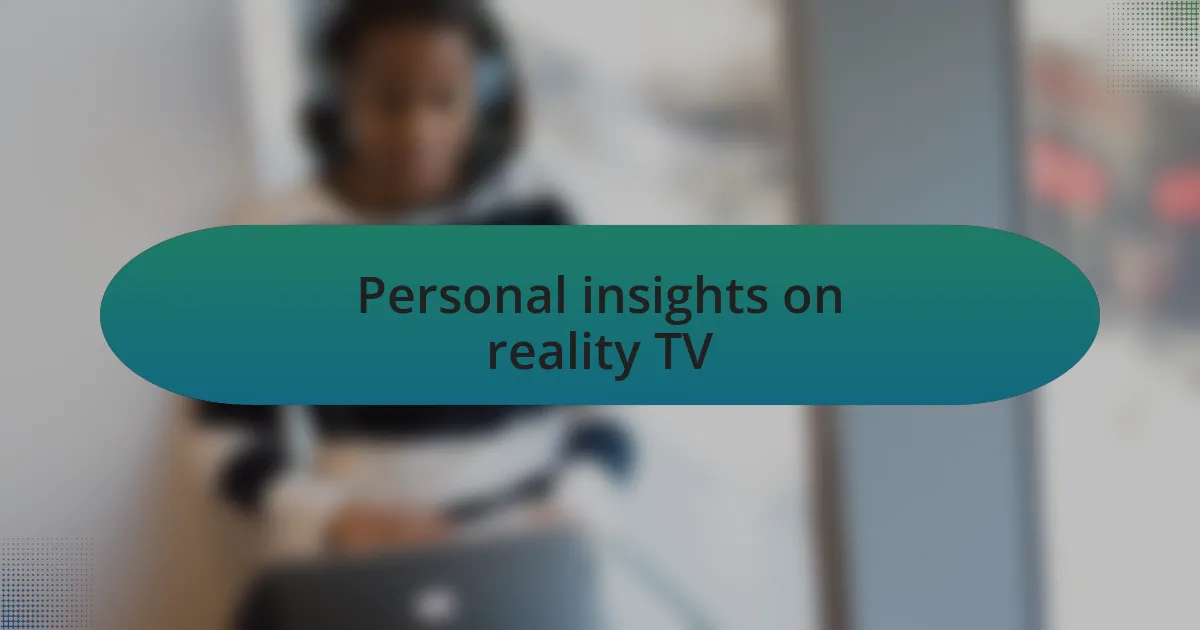
Personal insights on reality TV
Watching reality TV has certainly shaped my understanding of human behavior. I remember tuning into a dating show where the connections were both awkward and touching. I was struck by how participants genuinely opened up about their past heartbreaks, allowing viewers to witness growth and healing. It made me realize that, regardless of the show’s superficial premise, there are real stories of vulnerability and resilience unfolding before us.
One thing that really surprised me is how relatable the challenges participants face often are. I once watched a season focused on business entrepreneurs, and I couldn’t help but feel a deep connection to their struggles. As they navigated failures and celebrated small wins, I found echoes of my own journey in their experiences. It left me pondering—if these individuals can confront their fears on national television, what’s stopping me from taking risks in my own life?
I also think about the dichotomy between entertainment and ethics. There was a moment during a reunion episode of a reality competition that haunted me. Contestants faced off, hurling insults, all while producers stirred the pot. It left me contemplating the price of fame and the lengths people go to for television glory. Is it worth sacrificing one’s dignity for a shot at stardom, even if it’s just a fleeting second on screen? This moral quandary sticks with me long after the credits roll.
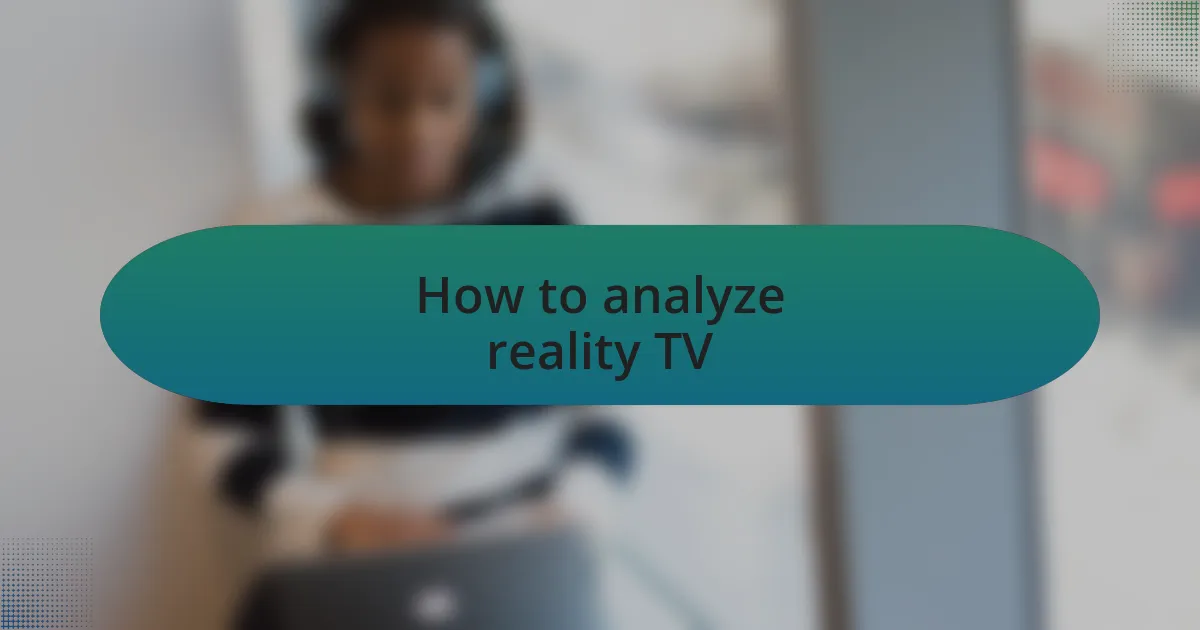
How to analyze reality TV
When analyzing reality TV, it’s crucial to look beyond the surface of the drama and grasp the underlying narrative arcs. For instance, I often dissect the character dynamics; watching how relationships evolve or devolve can be a fascinating lens through which to view real-life social interactions. Have you noticed how some contestants form alliances based on shared vulnerabilities? It’s a powerful reminder of how common experiences can bond people, even in the most artificial environments.
Another aspect I love to scrutinize is the editing techniques employed by producers. I once watched a series where a contestant seemed villainous one episode, only to appear heroic in the next. This manipulation of perception left me questioning how much of what we see is the true story. What if the edits are deliberately crafted to provoke specific viewer emotions? Understanding this can turn a simple viewing experience into a deep dive into media influence and the power of narrative shaping.
Lastly, consider the motivations behind the participants’ actions. I remember feeling a mix of admiration and pity for a contestant who seemed desperate for approval. It made me reflect on how societal pressures can drive individuals to extremes for fame. Do these moments reveal something deeper about our collective psyche? Analyzing motivations offers a window into the complexities of human desire and the lengths individuals will go to claim their moment in the spotlight.